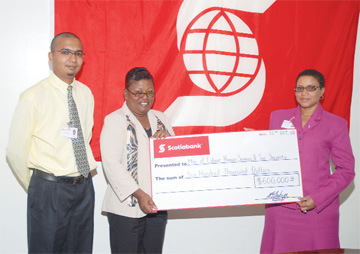-targeting youths
The Ministry of Health is increasing its efforts in the anti-tobacco campaign targeting youths and recreational smokers and is calling on leaders to assist in persuading the said groups to adopt healthy lifestyles.
According to a Government Information Agency (GINA) press release Minister of Health Dr Leslie Ramsammy made these disclosures during his address at the National Tobacco Strategy review and consultation held recently. The minister mandated that the National Tobacco Council start working on a public awareness campaign to spread the message of abstinence for smokers on “World No Tobacco Day” to be observed on May 31, 2009.
If everyone who smokes abstains for that one day, it will be a remarkable start to smoke-free days in Guyana,” Ramsammy said. In order to achieve this, he said that awareness has to start with the families of smokers and even non-smokers through the health centres. The minister told representatives of public health institutions, the private sector, government agencies, the University of Guyana and faith-based organisations that it is important that they assist in spreading the message of no smoking. “This is a responsibility of all elders and leaders in society, and those persons who are seen as role models in communities and to a greater extent all parents,” Ramsammy said.
According to GINA earlier in the year the ministry launched a policy aimed at preventing tobacco use among youths. The policy focuses on three main areas: the exposure of youth to tobacco smoke, sales to minors and the fact that they are smoking. “Tobacco must cease to be a killer and the only way to do that is for us to have smoke free spaces in the country, not just at institutions but Guyana must be a smoke free country,” the minister said.
Guyana has adopted the Health Facility Licensing Act now in operation which mandates that all health facilities, public and private, to be no smoking zones.
PAHO/WHO Country Representative Dr Kathleen Israel challenged the audience to create more public education programmes which target the younger generation on the dangers of the use of tobacco. The message of abstaining from tobacco use will also target persons who are not full addicts. “We also understand that there are many people once they begin to realize how tobacco has had a negative impact on their life want to stop smoking and cannot because their addictive process is so strong,” Israel said.
She also pledged PAHO’s continued assistance in the implementation of anti-tobacco campaigns to make sure that the objectives of the Framework Convention on Tobacco Control (FCTC) are fully achieved in Guyana. Guyana became a signatory in 2005. Additionally, Israel complimented the government for having a strategy on tobacco control, which most of the countries which are signatories to the FCTC do not have.
According to data collected from the Global Youth Tobacco Survey conducted in Guyana in 2004 11.1 per cent of students currently smoke cigarettes and 18 per cent of students currently smoke any form of tobacco products. As it relates to their exposure to tobacco smoke, 33.7 per cent live in homes where others smoke in their presence and 30% have one or both parents who smoke. The survey also showed that access to cigarettes is very easy with 43.7 per cent being able to access cigarettes in the home and 35.2 per cent able to buy cigarettes in the stores without any queries being made.





